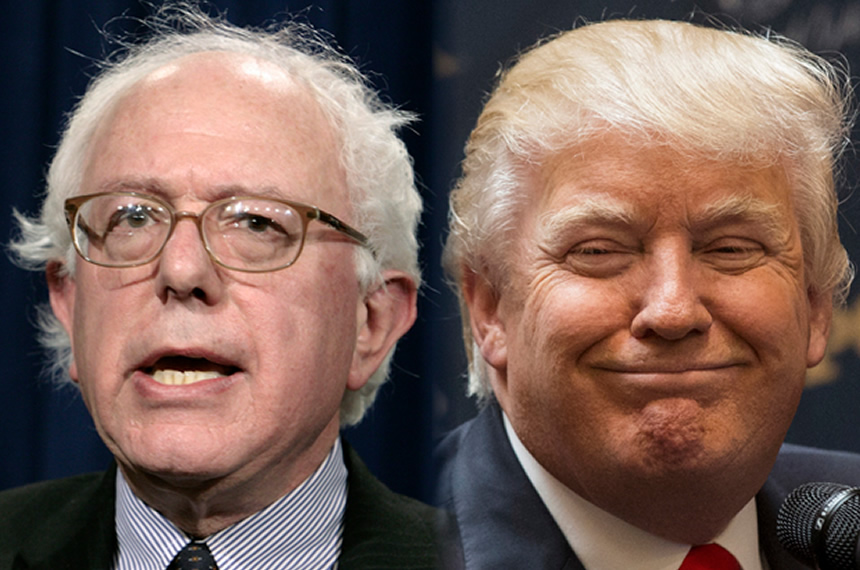
In utterly different ways, Donald Trump and Bernie Sanders have struck fear into the hearts of a smug, ossified and intellectually lazy establishment. Yet whether either man can make the leap from protest candidate to having a shot at actually winning the White House remains to be seen. Making that leap will require, among other things, that each spell out a plausible foreign policy vision.
Given how stale and predictable discussions of foreign policy have become, the field for offering something different is wide open. Yet the risks inherent in departing from orthodoxy are great. As past campaigns have shown, missteps in discussing America’s role in the world can compromise a candidacy with fatal effects.
Although running for the nomination of the Republican Party, Trump does not qualify as a conservative. When it comes to foreign policy, his instincts are those of a nationalist. He is an America Firster, inclined to see the outside world as filled with scheming foreigners intent on taking advantage of the United States and sticking Americans with the tab.
Although running for the nomination of the Democratic Party, Sanders does not qualify as a conventional liberal. When it comes to foreign policy, he remains a cipher, having yet to translate his progressive inclinations into anything of substance. The Sanders candidacy has centered on his advocacy of a “political revolution” here at home. Yet by privileging domestic issues related to economic fairness and social justice, he too is an America Firster, albeit a closeted one.
For establishment candidates like Hillary Clinton and the several Republicans remaining in the race, the mere phrase America First implies abdication and retreat. In their camp, no substitute exists for assertive American leadership exercised on a global scale.
Yet leadership in this context has long since become a euphemism for the use or threatened use of military power. Mainstream Democrats and mainstream Republicans are equally committed to this proposition. Hence, the absence of any serious discussion of what the application of this proposition has yielded since the end of the Cold War.
The United States today finds itself engaged in more or less permanent war. None of the mainstream candidates offers an alternative to that war’s continuation — hence, the prevailing establishment consensus in favor of escalating the fight against ISIS and deepening U.S. military involvement in the Syrian civil war.
How is it that the decades-long U.S. military involvement in the Greater Middle East finds that region in a bigger mess today than it was 30 years ago? On this central question, Clintons and Bushes — both families having contributed mightily to the resulting chaos — have little to say. Nor do the likes of Ted Cruz, Marco Rubio and John Kasich, each of whom promises, if elected, more of the same.
In effect, the Democratic and Republican establishments see no alternative to the perpetuation of failure. Having given up the attempt to identify any such alternative, they instead recite platitudes and offer testimonials to the troops.
Trump and Sanders can — indeed must — do better, which means redefining American leadership.
Trump the nationalist might approach leadership as a business proposition. Except where family is involved, decisions allow no room for sentiment. Survival requires recognizing when you’ve made a bad investment and having the courage to cut your losses.
If he curbs his penchant for grandiosity — granted, a big if — Trump could build a strong, reasoned case demonstrating that the United States has for years now misused its military, thereby wasting a costly asset. One way to stem the flow of red ink might be to emphasize core functions, focusing the Department of Defense on defending the United States rather than policing the world.
Sanders the progressive could take Trump’s critique a step further. The misappropriation of resources for misguided wars produces economic and social distortions that contribute directly to inequality and injustice at home. Redressing the latter, he might argue, requires first ending the former. Providing the Pentagon with the wherewithal to keep America safe need not take precedence over providing Americans with health care, education and jobs paying a decent wage.
To such arguments, the foreign policy establishment would reply with cries of heresy, charging both Trump and Sanders with the unforgivable sin of isolationism. But in an election where people have tired of listening to that establishment, a bit of America Firster heresy just might find favor with voters.
Bacevich is professor emeritus of history and international relations at Boston University. His forthcoming book is “America’s War for the Greater Middle East: A Military History.”



Expositores: Oscar Vidarte (PUCP) Fernando González Vigil (Universidad del Pacífico) Inscripciones aquí. Leer más
Una retrospectiva para entender los próximos cuatro años. Leer más
En la conferencia se hará una presentación de los temas más relevantes del proceso de negociación se llevó a cabo desde el 2012, así como del acuerdo de paz firmado entre el Gobierno colombiano y la guerrilla de las FARC a finales del 2016. Se analizarán los desafíos y las... Leer más
El Observatorio de las Relaciones Peruano-Norteamericanas (ORPN) de la Universidad del Pacífico es un programa encargado de analizar y difundir información relevante sobre la situación política, económica y social de Estados Unidos y analizar, desde una perspectiva multidisciplinaria, su efecto en las relaciones bilaterales con el Perú.
© 2026 Universidad del Pacífico - Departamento Académico de Humanidades. Todos los derechos reservados.

